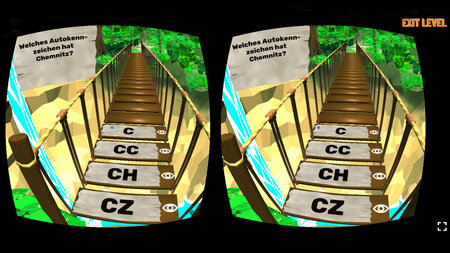ECTS - Frequently Asked Questions
ECTS and Chemnitz University of Technology
This information package describes Chemnitz University of Technology and the courses offered by its Department of English & American Studies in order to help the prospective ECTS student to prepare for their study period at this institution.
What is ECTS?
ECTS, the European (Community Courses) Credit Transfer System, was developed by the European Community in order to provide common procedures which could be followed in all EC countries in order to evaluate academic qualifications and guarantee their recognition abroad. It provides a method for measuring and comparing learning achievement and transfering credits from one institution to another. The ECTS is based on the principle of mutual trust and understanding between the participating institutions of higher education. The few rules of the ECTS, which concern the scope of information to be provided on available courses, the conditions for agreement between the home and host institutions and the use of credit points to indicate student workload, are designed to reinforce this mutual trust and understanding. Each ECTS department provides information about the courses it offers in terms of content as well as by assigning credits to each of them.
The ECTS Credits
ECTS credits are a numerical value allocated to course units to measure the student workload required to complete them. They reflect the quantity of work which each course unit requires in relation to the total quantity of work necessary to complete a full year of academic study at the institution. This includes lectures, practical work, seminars, tutorials, field work, private work - in the library or at home - and examinations or other assessment activities. ECTS credits reflect a relative value of student workload. In ECTS, 60 credits represent the workload of one academic year of study; and usually 30 credits are given for a semester (6 months). It is important that no special courses are set up for ECTS purposes, but that all ECTS courses are mainstream courses of the participating institutions, followed by native students under normal regulations. It is up to the participating institutions to subdivide the credits for the different courses. Laboratory work and optional courses which form an integral part of the course of study also count as academic credit. Laboratory sessions and optional courses which do not form an integral part of the course of study do not count as academic credit. Credits are awarded only when the courses have been completed and all required examinations have been successfully taken.
Types of courses and assessement
VORLESUNG:
2 contact hours per week (1 contact hr = 45 minutes) LECTURES are open to students of all semesters. Lectures usually present an overview of an era or subject in the light of the latest research. There is usually no student-teacher interaction in the form of discussion and no examination at the end of a lecture course. ECTS credits: 3cr
BA SEMINAR:
2 contact hours per week (1 contact hr = 45 minutes) SEMINARS IN BASIC STUDIES concentrate on limited areas within the four subdisciplines: English Linguistics, English Literature, American Literature, and Cultural Studies and aim to teach students to apply and develop academic working techniques. Course requirements are beside individual assignments an oral presentation and a typed term/research paper of appr. 10 pages. ECTS credits: 5 cr
MA SEMINAR:
2 contact hours per week (1 contact hr = 45 minutes) SEMINARS IN ADVANCED STUDIES provide students with the opportunity to choose a topic within the given subject and do their independent research; results and progress are presented and discussed in class. Each student is expected to submit a typed research paper of appr. 20 pages on their individual research topic. ECTS credits: 5 cr
ÜBUNG:
2 contact hours per week (1 contact hr = 45 minutes) PRACTICAL COURSES are offered in any of the subdisciplines including English language practice. They are often survey-type or project-based courses but also preparatory courses for examinations. Assessment may vary somewhere from a final test and submitted papers to project participation or internet page designing. ECTS credits: 3 for language practice courses
ECTS Students
Students participating in ECTS will receive full credits for all academic work successfully carried out at any of the ECTS partner institutions, and they will be able to transfer these academic credits from one participating institution to another as long as there is prior agreement between the institutions involved. All students of the participating faculties who would like to take part in the ECTS may do so if their institution agrees. Most students participating in the ECTS will study at one host institution in an EC Member State or EFTA country for a limited period and then return to their home institution. Some may decide to stay at the host institution and finish their degree there. Some may also decide to proceed to a third institution to continue their studies there. In each case, students are required to comply with the legal and institutional requirements of the country and institution from which they graduate.
Students can continue their studies at their home institution with no loss of time or credit once they have successfully completed the study programme previously agreed between the home and host institutions. On the other hand, if a student decides to stay at the host institution and complete his or her degree, he or she may have to adapt his or her study course due to the legal, institutional and departmental rules of the host country, institution and faculty.
Students selected by an ECTS institution will receive a student mobility grant only if they fulfil the general conditions of eligibility for the SOCRATES grant. These are:
- students must be citizens of an EC Member State or an EFTA country (or recognized by one Member State or one EFTA country as having official status as a refugee, stateless person or permanent resident); as EFTA nationals, students will be eligible provided they are moving within the framework of SOCRATES from the respective EFTA home country to an EC Member State. EFTA nationals registered as students in ECTS institutions in other EFTA countries or in Community Member States are only eligible for participating in the ECTS if they have established a right of permanent residence;
- students are not required to pay tuition fees at the host institution; they may, however, be required to continue to pay their normal tuition fees at the home institution during the study period abroad;
- if a student receives a national grant ("BaföG" in the Federal Republic of Germany) it will not be discontinued, interrupted or reduced while that student is studying in another Member State and is receiving an SOCRATES grant;
- a study period abroad should be no less than three months or more than one year;
- first year students are not eligible for receiving SOCRATES grants.
For further details on ECTS, please consult the ECTS Brochure available from: ECTS Department, SOCRATES/ERASMUS Bureau, Rue Montoyer 70, B-1040 Brussels, Tel: 32-2-233 01 11, fax: 32-2-233 01 50.





